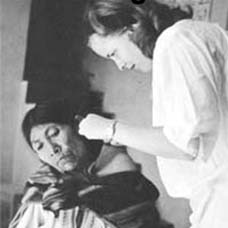
Determined to make a difference, Mae Jemison served two-and-a-half years as a Peace Corps medical officer in Sierra Leone and Liberia before joining NASA in 1987.
Then & Now: Dr. Mae Jemison
Monday, January 10, 2005 Posted: 6:26 PM EST (2326 GMT)
(CNN) -- Long before Dr. Mae Jemison became the first African-American woman in space as a crew member of space shuttle Endeavor, she was fascinated by science. These days, she's passing that passion on through her foundation dedicated to what she calls "science literacy."
Growing up in Chicago, Jemison looked at the "Star Trek" character Lt. Uhura and saw her future.
"What was really great about 'Star Trek' when I was growing up as a little girl is not only did they have Lt. Uhura played by Nichelle Nichols as a technical officer -- she was African," said Jemison, who was born in Decatur, Alabama.
"At the same time, they had this crew that was composed of people from all around the world and they were working together to learn more about the universe," she said. "So that helped to fuel my whole idea that I could be involved in space exploration as well as in the sciences."
On September 12, 1992, at age 35, Jemison went where no African-American woman had gone before - into space as a member of the crew of Endeavor.
"My commander, Hoot Gibson, called me up on the flight deck and I looked out and there was Chicago. It was absolutely fascinating.
"Once I got into space, I was feeling very comfortable in the universe. I felt like I had a right to be anywhere in this universe, that I belonged here as much as any speck of stardust, any comet, any planet," she said.
Jemison, who says she was a curious child, credited her parents for encouraging her to quench her curiosity by researching and reasoning things through. Her mother was a teacher and she describes her father as "the best mathematician I knew." It wasn't long before she developed a love for the sciences.
Jemison received a scholarship to Stanford at the age of 16 and graduated with a bachelor's degree in chemical engineering as well as a degree in African and Afro-American studies.
She went on to earn a doctorate in medicine from Cornell University in 1981.
Determined to make a difference, Jemison served two-and-a-half years as a Peace Corps medical officer in Sierra Leone and Liberia before joining NASA in 1987.
After six years, she resigned from NASA and formed The Jemison Group, Inc., which focuses on the integration of science and technology into daily life.
"I've been very involved in science literacy because it's critically important in our world today," she said. "As a public, we're asked to vote on issues, we're asked to accept explanations, we're asked to figure out what to do with our own health care, and you can't do that unless you have some level of science literacy.
"Science literacy isn't about figuring out how to solve equations like E=MC2," she said. "Rather, it's about being able to read an article in the newspaper about the environment, about health care and figuring out how to vote on it. It's about being able to prepare nutritious meals. It's about being able to think your way through the day."
Since 1994 she's also run a four-week science camp for kids between the ages of 12 and 16 called "The Earth We Share."
Jemison, who now calls Houston, Texas home, also founded and has headed The BioSentient Corp. since July 1999. BioSentient's major project is a device that provides mobile monitoring of the involuntary nervous system.
"We've been working on equipment that allows physicians to get information in real time about what's happening to their patients' nervous system, what's happening to their body. You can use it for things like neurological complications of diabetes, anxiety disorders, human performance in sports, a range of things."
She has considered a future in politics, has been awarded honors and decorations and holds multiple honorary doctorates. But she is still tickled about appearing in an episode of "Star Trek: The Next Generation."
"It was called 'Second Chances,'" she said. "It was all about the fact that our fantasies lead our realities and our realities lead our fantasies and it comes full circle again."
"'Star Trek' was one of our best fantasies," she said, then added with a laugh, "And besides, I got to meet Worf (Michael Dorn, who plays the Klingon head of security.)"










